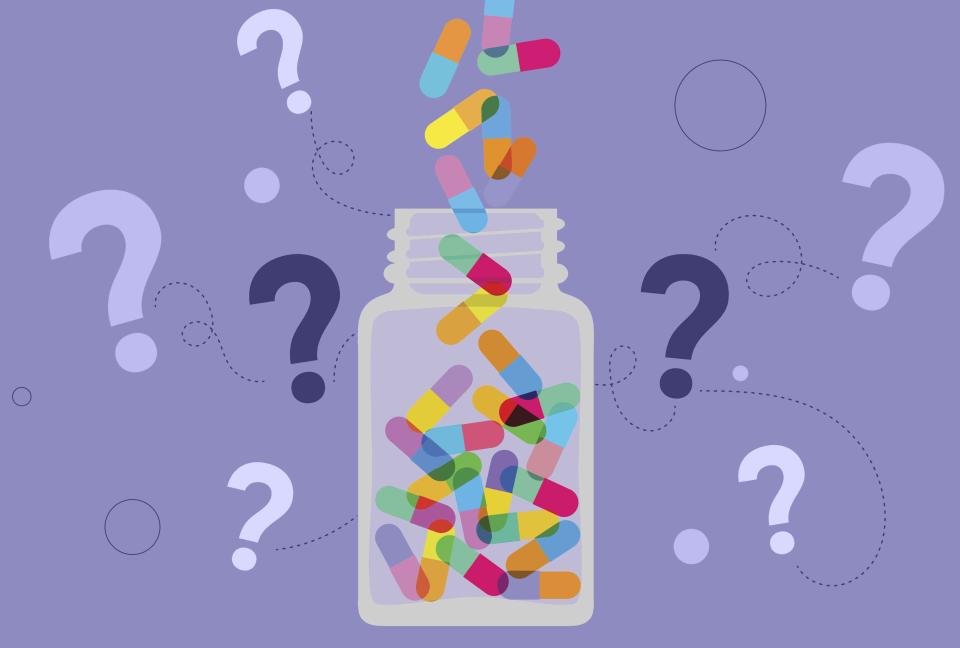Is It Safe to Take Expired Multivitamin Supplements? Here’s What Health Experts Say
Also, discover how long they last and tips for storage and disposal.

Getty Images
Reviewed by Dietitian Maria Laura Haddad-Garcia
It’s that time of year when people start making New Year’s resolutions to kick-start their health journey. One common first step toward a healthier self is paying attention to vitamin and mineral intake. According to the National Institute on Aging, these nutrients are essential for staying healthy and boosting vitality. But when dusting off that unopened bottle of multivitamins from last year, you might ask yourself: “Is it safe to take expired multivitamin supplements?”
Fortunately, we spoke with a registered dietitian who answered that exact question. Read on to uncover whether it’s safe to take expired multivitamins, tips for storing them, and when it’s time to throw them away.
Related: What Happens to Your Body If You Eat Too Many Vitamin Gummies
Do Multivitamins Expire?
While multivitamin supplements won’t spoil like a carton of milk, their potency can decline over time. According to a 2017 review published in The American Journal of Clinical Nutrition, multivitamins, on average, are formulated to maintain their efficacy for about two years from the manufacturing date. However, this doesn’t necessarily mean they turn harmful once the calendar flips past the two-year mark.
Catherine Gervacio, RND, a registered nutritionist-dietitian and certified exercise nutrition coach at EHProject, tells EatingWell, “The shelf life of multivitamin supplements varies, but it may take approximately two to three years for unopened multivitamin products to expire. Once opened, it is ideal to consume them within six months. Always check the expiration date on the packaging to be sure.”
Is It Safe to Take Expired Multivitamins or Other Types of Supplements?
The risk of expired multivitamins causing serious harm is low. However, they become less potent after the expiration date. As vitamins break down over time, they may not deliver their promised nutritional punch. However, the potency loss might be negligible for some vitamins even after expiration.
“It is not recommended to take expired multivitamins because their potency will have decreased,” Gervacio explains. “Therefore, they may not provide the supposed benefits they will contribute to health. As for safety, they don’t rot or spoil like food, so they won’t generally cause harm.”
Related: 4 Sneaky Signs You Might Need a Multivitamin
Are There Side Effects of Taking Expired Multivitamins?
The vitamins and minerals within supplements can degrade over time, reducing their potency. The good news, though, is that this decline typically doesn’t pose any significant health risks. Instead, the risk lies in diminished nutritional benefits. Think of it like sipping a flat soda water—not harmful, but lacking the fizzy flavor you crave. Gervacio says, “In general, there are no known side effects of taking expired multivitamins. The only concern when taking expired vitamins is their potency and effectiveness.”
How Should You Dispose of Expired Multivitamins?
When it comes to disposing of expired multivitamins, keep the following in mind:
Avoid tossing them in the trash: Most containers are non-biodegradable and can negatively impact the environment.
Don’t flush them down the toilet: Flushing multivitamins can contribute to water pollution.
Take them to a local pharmacy: Pharmacies are best equipped to dispose of supplements safely.
Participate in community take-back programs: Some communities have specific guidelines for medication disposal.
“Take precautions in disposing of expired multivitamins and make sure they’re out of reach of children and pets,” advises Gervacio. “Remove the contents from the packaging. It’s also best to remove personal information from the packaging for identity protection. Mix the multivitamins with unappealing substances like dirt, used coffee grounds or dirt. If there’s an available medical disposal bag, use it to throw the multivitamins in the household trash. Otherwise, use any disposable plastic bag and seal it.”
Related: Is It Safe to Take Expired Protein Powder? A Dietitian Weighs In
What’s the Best Way to Store Multivitamin Supplements?
“The best way to store multivitamins is to keep them in a cool and dry place, away from heat and sunlight exposure,” says Gervacio. “Keep them in their original packaging. Avoid storing them in areas with high humidity like bathrooms and kitchen.”
To maintain your multivitamins’ potency, store them in a cool, dark place like a cupboard or pantry. Research, such as a 2022 article in Heliyon, shows that exposure to heat and light can compromise the efficacy of some vitamins over time. Additionally, ensuring your supplements are stored in an airtight container can prevent oxygen from degrading their effectiveness.
The Bottom Line
Taking multivitamin supplements past their expiration date may be considered generally safe, as their best-before date is when they begin losing their potency. While the risk of severe health issues from expired multivitamins is low, consuming them won’t pack the same nutritional punch as they would during their peak potency period. To help your multivitamins last longer, store them in an airtight container in a cool, dark place like a cupboard or pantry. As always, the best approach to getting your vitamins and minerals is through a healthy, well-balanced diet. Talk to your health care provider or doctor before taking any new supplements, and to confirm taking expired ones is safe for you.
Read the original article on Eating Well.

